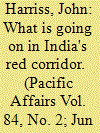| Srl | Item |
| 1 |
ID:
189970


|
|
|
|
|
| Summary/Abstract |
This study focuses on Chinese peasants’ behavioural logic after the abolition of agricultural taxes in 2006. The everyday words and deeds of the residents of an ordinary village in Gansu Province were observed and interpreted. Their behavioural logic can be conceptualized as ‘heteronomous rationality’, according to which one’s behavioural choice is based on whether one is treated equally and fairly in comparison with others. When deviations from this standard are observed, rural peasants are motivated to protest. This study further examines when and how this Chinese-style peasant egalitarianism was shaped.
|
|
|
|
|
|
|
|
|
|
|
|
|
|
|
|
| 2 |
ID:
165944


|
|
|
|
|
| Summary/Abstract |
There are many protests about loss of village land in rural China. By following both short-term and long-term outcomes of one such protest, in Wukan, Guangdong, this article illustrates the strategies Chinese governments employ to appease protesters, and the consequences of a local protest for individuals, the protest group, and the broader society.
|
|
|
|
|
|
|
|
|
|
|
|
|
|
|
|
| 3 |
ID:
105183


|
|
|
|
|
| Publication |
2011.
|
| Summary/Abstract |
Drawing on the small number of recent ethnographic studies, on reports by human rights activists, and on some reports by journalists, this paper explores reasons for the strength of the Maoist insurgency across the "red corridor": a large tract of India, from the border with Nepal through to the south. It finds that while the "feasibility thesis," as developed by Fearon and Laitin in particular, amongst recent general theorists of the determinants of civil war and insurgency, has explanatory power, there is also evidence of the significance of "grievance," especially amongst the tribal people of central India. The Maoists have certainly not always been the drivers of resistance to the many cases of realized or attempted dispossession across the region, but they seem to be sympathetic to movements of resistance, and often to articulate grievances against the state, both for what it has done (encouraging expropriation for mining, infrastructural and industrial projects) and for what it has not done (in the supply of basic services). The alternative "greed" hypothesis is found to be less strongly supported, though rents from the rich mineral and forest resources of central India do play a part in the story. The Maoists support people's aspirations but their supportive moves can be in contradiction with their broader strategic ambitions-of taking over state power-and the spiral of violence that often follows can end up betraying those whom they claim to support.
|
|
|
|
|
|
|
|
|
|
|
|
|
|
|
|